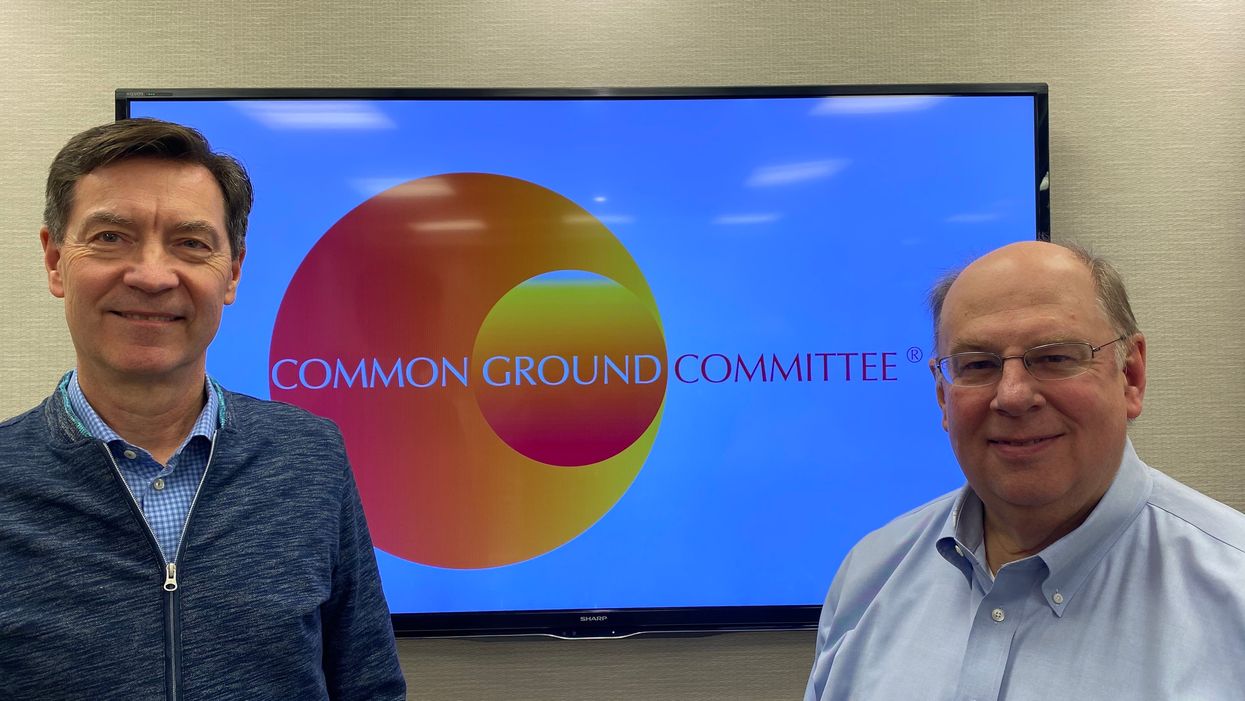Bruce Bond and Erik Olsen have been friends since middle school in New Canaan, a tony Connecticut suburb of New York, where they indulged their shared passion for debating politics, economics and other current events. Bond was a distance runner at Princeton and then spent 30 years as an information technology entrepreneur, software developer and industry analyst. Olsen went to Principia College and got an MBA from UCLA before launching his career in investment management, fund management and real estate investment.
On a joint family vacation in 2009, while bemoaning the angry tenor of public discourse, they landed on the concept for their organization. Common Ground Committee's main work is hosting public forums where prominent figures from opposing ends of the political spectrum reveal their shared areas of agreement on an often polarizing public policy issue. Their answers have been edited for clarity and length.
What's democracy's biggest challenge, in 10 words or less?
Both: The inability of elected officials to overcome emotion with reason.
Describe your very first civic engagements.
Bond: It was in seventh grade. I had recently become interested in environmental issues and volunteered to be the student leader and organizer on my town's "Clean Your Mile Day" committee.
Olsen: When my children were younger, we worked at a homeless shelter during Christmas through an activity organized by member of our church in California. I've been active in church since my teens.
What was your biggest professional triumph?
Bond: Nothing in my career has been more satisfying than obtaining the recognition, funding and personnel that enabled Common Ground Committee to move from a bootstrapped, volunteer-only startup to a strong, growing and talent-rich organization.
Olsen: I've been self-employed in small businesses since 1986, which in itself is a professional triumph. But I must echo Bruce, who deserves most of the credit, that getting CGC to its current level of operations has been quite an achievement.
And your most disappointing setback?
Bond: While working for a tech start-up, the company was purchased by a larger firm. I had been assured I would be able to benefit greatly should that happen. But the founders had decided behind closed doors that the spoils of a buyout would not be shared by non-owners. It was very disappointing, but it was my fault for not getting something in writing when I joined the firm.
Olsen: Not being able to stabilize the business I developed with two partners in 2014. Everyone we talked with thought we had a great idea, including prospective clients. But we could not get enough to sign on the dotted line.
How does your identity influence the way you go about your work?
Bond: My identity has a lot to do with a "no limits" mindset and putting a high value on inclusion and teamwork. From what I know about the democracy reform movement, both are crucial if we are ever to bring healing to the problems of incivility and polarization in the nation's politics.
Olsen: At Common Ground Committee I'm influenced by my desire to find truth. It leads me to constantly question things. But I've come to realize that my sense of truth is not necessarily shared by others.
What's the best advice you've ever been given?
Bond: My favorite advice was from my dad the day before my wedding: "Remember that what's yours is hers, and what's hers is hers." But the best advice was really from a teacher and mentor who instilled in me the value of listening for direction — particularly from the "voice within."
Olsen: Don't make decisions based on fear.
Create a new flavor for Ben & Jerry's.
Bond: I'm confident they would have a best seller in Common Grounder Swirl, a mix of vanilla and chocolate ice cream ribbons.
Olsen:Maybe a blueberry and raspberry swirl. With nuts.
"West Wing" or "Veep"?
Bond: Neither one. I prefer "24" and the Jack Bauer relationship with the president. President David Palmer had it going on!
Olsen: "West Wing." If it were only that easy. And clear.
What's the last thing you do on your phone at night?
Bond: After plugging in the phone to recharge overnight, I take my iPad to bed and will often turn out the light and listen to a recorded article using a soft headband with wireless speakers in it. Works every time.
Olsen: Set the timer to shut off the podcast I'm listening to after 15 minutes.
What is your deepest, darkest secret?
Bond: I went to my high school senior prom with the 13th girl I asked. The first 12 politely declined. Very humiliating.
Olsen: I would prefer a romantic old movie to any sporting event — except possibly the Super Bowl, if there is a party.





















